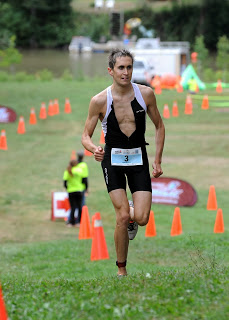There seems to be a pervasive belief that successful endurance athletes must eat like birds and exercise extreme restraint with food. Some elite athletes and media seem all too pleased to perpetuate these myths. For example, did Lance Armstrong really “go without meals a lot of times”? Did Craig Alexander just have a recovery shake after his 8 hour training day? Did Jan Frodeno really only sip an espresso after his 6k swim? Was that low-carb meal enough to refuel Meb Keflezighi after his 12 mile tempo run? As any serious athlete can attest, these guys must have slammed some major calories off-camera!
Some of these role-models will happily discuss training and equipment, but are tight-lipped or even misleading when it comes to their diet (with some awesome exceptions). To me this behaviour suggests a less-than-healthy relationship with food, or at very least, a level of discomfort with the topic. The reality is that big training demands big eating, something I’ve finally come to accept and enjoy. No one should feel uncomfortable or ashamed about that.
Finding my racing weight
Faced with these attitudes and stereotypes, I fell prey to the mentality that “lighter is better”. For years, increasingly restrictive eating habits coupled with more and more training gradually brought my weight and body fat down to an unsustainable level. Last season, I bottomed out around 137 pounds which, at 6 feet tall (BMI < 19), is pretty skinny by elite running and cycling standards and unrealistic for a triathlete.
I was running well, but progress with swimming and cycling slowed and eventually stalled. And other things were amiss; I developed early morning insomnia, was often cold, constantly appeared tired and would feel totally wrecked some days, seemingly at random. Without a coach to give me a reality check, I soldiered on, training through greater and greater fatigue.

Unfortunately, it took some troubling blood test results to jolt me back to reality. I spent a month moping around, researching overtraining syndrome, imagining worst case scenarios, and stressing about my health. Just about the only productive thing I did was a ton of research. When my thoughts turned from self-pity to optimism, I resolved to go about rebuilding my general health first, then my fitness.
I am convinced that chronically low weight and body fat, among other related factors, set the stage for my meltdown. In addition to restructuring my training and managing stress more effectively, gaining several pounds was a key part of my comeback plan. I figured that if I really disliked the extra weight, I could always drop it before the first races of the season. December, with all the holiday feasting, was the perfect time to start! A few weeks into my experiment, I started to feel way better, practically superhuman compared to before!
Now, nearly a year later and after a breakthrough triathlon season, I can safely say that the heavier me is here to stay. Here are some of the many benefits I noticed:
- Faster recovery and greater resilience: I bounce back more rapidly from races and hard workouts, and as a result, I can handle a more demanding training load and racing schedule.
- Improved performance: I made huge gains with cycling, significant gains with swimming and my running doesn’t seem to have suffered.
- More consistent energy level: I used to feel absolutely wrecked, foggy and exhausted some days, often without good cause.
- Improved sleep quality: Almost immediately, I began to sleep longer and more deeply, not surprising since being underweight is associated with impaired sleep. In a matter of months, I kicked the insomnia that had plagued me for years.
- Better appearance: In the past, my family and friends were always telling me that I looked “tired”, a socially-acceptable euphemism for “you look like shit”. My Dad recently informed me that I “look like a man”!
- Stronger immune system: In the past, I was often sick and ended up on antibiotics at the end of last season. I haven’t had so much as a sniffle this year.
- Improved mood, due to all of the above. Poor mood has been linked to low weight.
Of course, given the other changes I made, I can’t attribute these improvements exclusively to gaining weight. Plus, athletic development in your early twenties is practically inevitable. What is clear from these improvements in my performance and general well-being is that my body is much happier with the extra weight. Based on my reading, my experience is not at all uncommon.
A fine line
I discovered that there is a fine line between an ideal body mass/composition and one that is suboptimal or unhealthy (at least in the long-term). In my case, it proved to be just a few pounds, and not all muscle. My body fat is also a little higher, but that’s ok. My goal isn’t to look shredded at the beach, but to stay fit and healthy over a long racing season and a long triathlon career. Unsustainably low body weight/fat can be a ticket to success in the short-term, but that success comes on borrowed time.
The world’s best have a team of specialists monitoring their condition. These athletes can afford to push the edge of the envelope to eke out every last bit of performance during a brief window of time. Most of us are lucky to get a blood test once a year! After my experience, I’d rather err on the side of caution with body weight/fat. In the long-term, it’s better to leave some seconds on the table than to risk burnout, injury or illness.
The experiment continues…
These days, I keep an eye on my weight but I don’t obsess over numbers on the scale. I trust that given a healthy diet and appropriate training load, my body will know what to do. I don’t believe that my ideal weight is some magic number, nor that it is a stationary target. Now, during the off-season, my “ideal” weight and body composition should and will differ a little from my mid-season “racing weight”. In fact, at 150 pounds, I’m currently the heaviest I’ve ever been. Next season, I’ll be approaching my racing weight from the other direction, the right direction!







